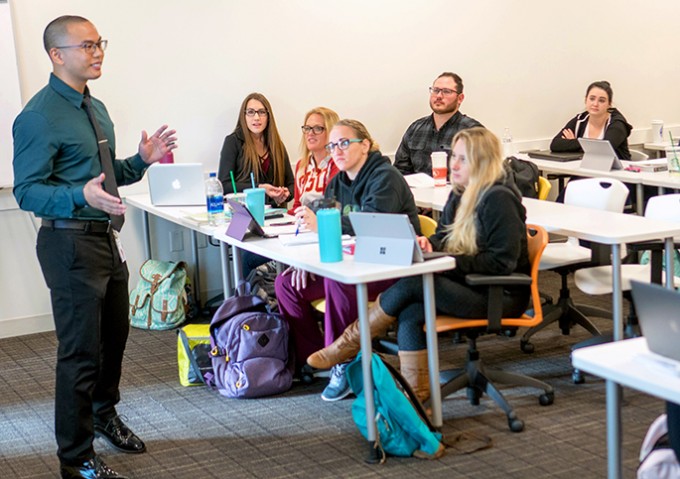My Specialty
Psychiatric Nursing Instructor, Edmund Alfonso, West Coast University
Training nurses to tackle the mental health crisis

Edmund Alfonso, RN, MSN-Ed.
Lead Faculty, Mental Health Department
Nursing Program, West Coast University, Ontario
Please describe the arc of your nursing career. How did you choose your specialty?
I finished my BSN at West Coast University (WCU) in Ontario in 2013 and was the class speaker at my pinning ceremony that April. Completing my nursing degree was the greatest accomplishment of my life. Sharing that moment with family and friends was incredible.
I was ready, and very excited, to provide meaningful care to those in need. However, at the time of my graduation, I had no burning desire to go into any specific nursing specialty. Among my top choices were ER, pediatrics, L&D and mental health.
Applying for a position at Canyon Ridge Mental Health Hospital was an easy choice because it was a seven-minute drive from my house; I had enjoyed my psych rotation in that facility; and I had several friends who were happily working there, so I felt I’d enjoy it.
It was at Canyon Ridge that I truly discovered my connection to mental health nursing. Everything about it drew me in. Mental illness is intriguing. No disease process has electrified my interest and curiosity more than schizophrenia.
What foremost mental health issues are nurses seeing today?
The big current challenge (which is long-standing) is spreading awareness and dispelling stigma, which go hand-in-hand. One in five people in the U.S. suffers from a mental illness. According to the American Foundation for Suicide Prevention, someone commits suicide in our country roughly every 15 minutes.
Mental health just isn’t being taught and talked about enough to change these figures in a meaningful way. Too many of us shy away from and turn our backs on people who are mentally ill when we really need to be turning towards them with helping hands. Support from family and friends has a massive effect on one’s ability to recover from emotional and psychological distress.
I’d love to see (and am actively advocating for) more discussions at all levels of education about stress management, healthy thinking, identifying psychological distress in others and how to access psychiatric support.
What led you to pursue a master’s in nursing education?
I always knew I’d eventually pursue teaching — for me, teaching tickles almost all of the same gratifying nerves as nursing does. Also, many of my role models throughout my life have been teachers. I always had the vision of giving others the same empowering experience. I completed my MSN-Ed. just as 2016 began. As soon as my degree came in, I applied at WCU Ontario.


